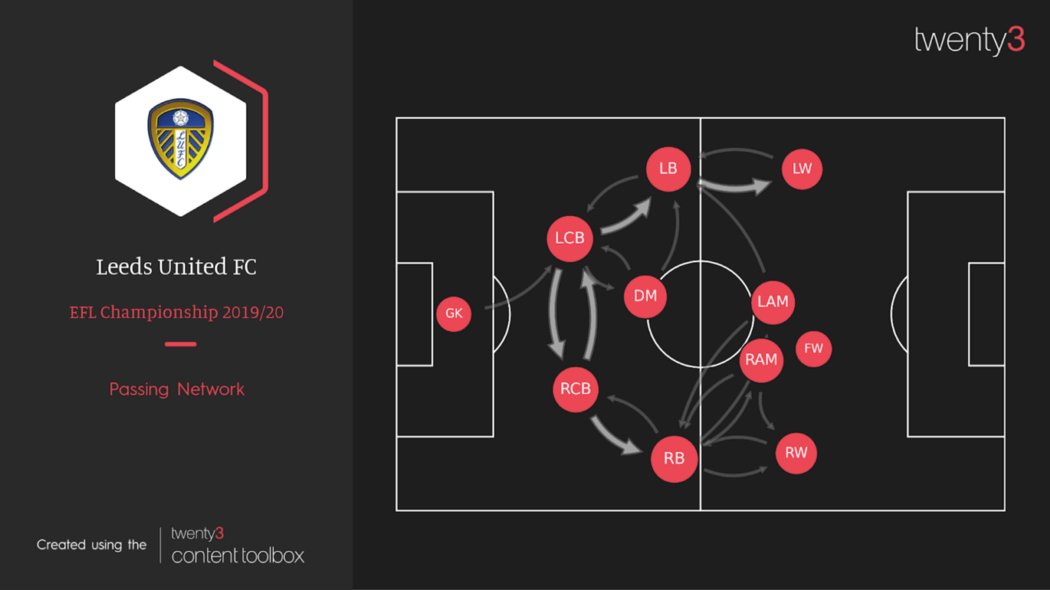A lot of people think Struijk isn't good enough in the build-up phase. Well, what does the DM do in build-up?
Here's a passing network from last season:
As you can see, Phillips' role in the Championship last season was largely facilitating build up in the wide area (on the left interestingly).
Per Wyscout, Phillips is putting up a figure of 7.03 long passes per 90 minutes and completes around 59%. Last season he was making 6.94 long passes per 90 mins at around 52%.
Per dribbles he's putting up similar numbers across both seasons (between 1 and 1.5 p90) and per duels he's putting up the same number (20 p90).
All of this suggests his role hasn't changed much over the last couple of seasons.
You can split the facets of Phillips' role into two: build-up and defensive. Build-up divides into two.
Defensive is the more simple. Phillips has a defensive responsibility - usually an opposition 10 or 8. He also is responsible for switching to players who are more dangerous than his immediate responsibility.
Phillips defends in two ways generally: laterally and backwards. If Leeds are sitting in a good defensive shape and an opponent drives wide, he'll leave his man and squeeze that player towards the touchline. Dallas has taken up a lot of this responsibility recently.
Here's a good example of this:
If Leeds are stretched in transition, Phillips will defend backwards and often drop into the defensive line to cover for whoever has picked up his defensive responsibility.
Phillips goes central to cover the threat, loses his responsibility so drops into the back line to play as a libero.
Phillips is good at this role because he is pretty mobile. The DM should be thought of as almost a CB role - you're playing as the first CB, breaking up the opposition attack and then filling in at the back when needed.
Struijk plays the role somewhat different to Phillips because he's a somewhat different defensive player to Phillips. Phillips is active and about early engagement. Struijk is more about anticipation and shepherding players into less dangerous areas.
Both have their benefits but I think a lot of fans naturally gravitate towards Phillips' more active approach because he looks like he's doing something. Struijk can also look like he's dithering.
In terms of build-up, the DM has two roles: link-up in deep areas and link up in advanced areas.
Leeds essentially attack through wide areas. This is last season's passing areas:
As you can see, most of the passing funnels out wide through the DM area and into the full backs. The DM's role in this phase of play is simple: offer an option to the CBs and try and get the ball into a wide area.
In this phase of play, the DM *very rarely* passes forwards. Usually, if Leeds are building up from the back, they will have a opposition midfielder preventing the DM from turning. This isn't an issue as the object of the exercise isn't attacking centrally but building up wide.
In this phase, I actually think Struijk has the edge on Phillips: he's better at short passing, better with both feet and is more press resistant than Phillips. This is why Bielsa likes to play him here (and why Ben White never really worked for us in DM).
The second phase is higher link-up play, when the ball has transitioned into the opponents' half and they're sitting in a defensive shape.
The DM is then expected to help move the ball from side to side or, if the DM receives the ball to feet facing forward against a team in a mid-block, can play crossfield balls into wingers.
This very much depends on opposition structure. Against Everton's 3-4-3, Phillips was given time and space to find players in behind wing backs. Against Brighton, Struijk was neither given time nor space, and the Brighton wing backs sat deep, preventing crossfield balls.
Here Phillips has the edge: he plays good crossfield balls and is a bit more willing to try passes into the box. However, Struijk is no slouch at the crossfield ball and, with time, should become more adventurous with his crossing.
In conclusion: it's important to think about the role that the DM is expected to play. Both Phillips and Struijk can play the role (albeit in different ways) and Stuart Dallas probably couldn't (not tight enough in build up) nor could Shack (not tight enough defensively).

